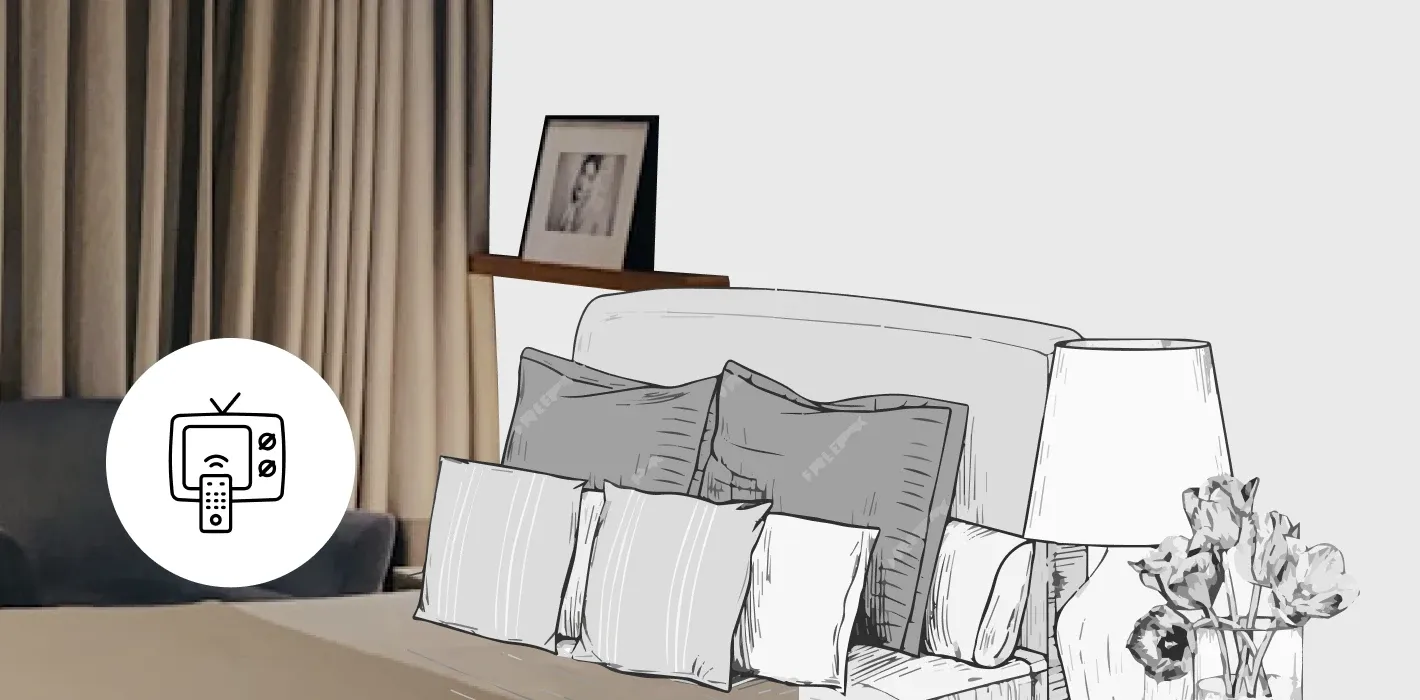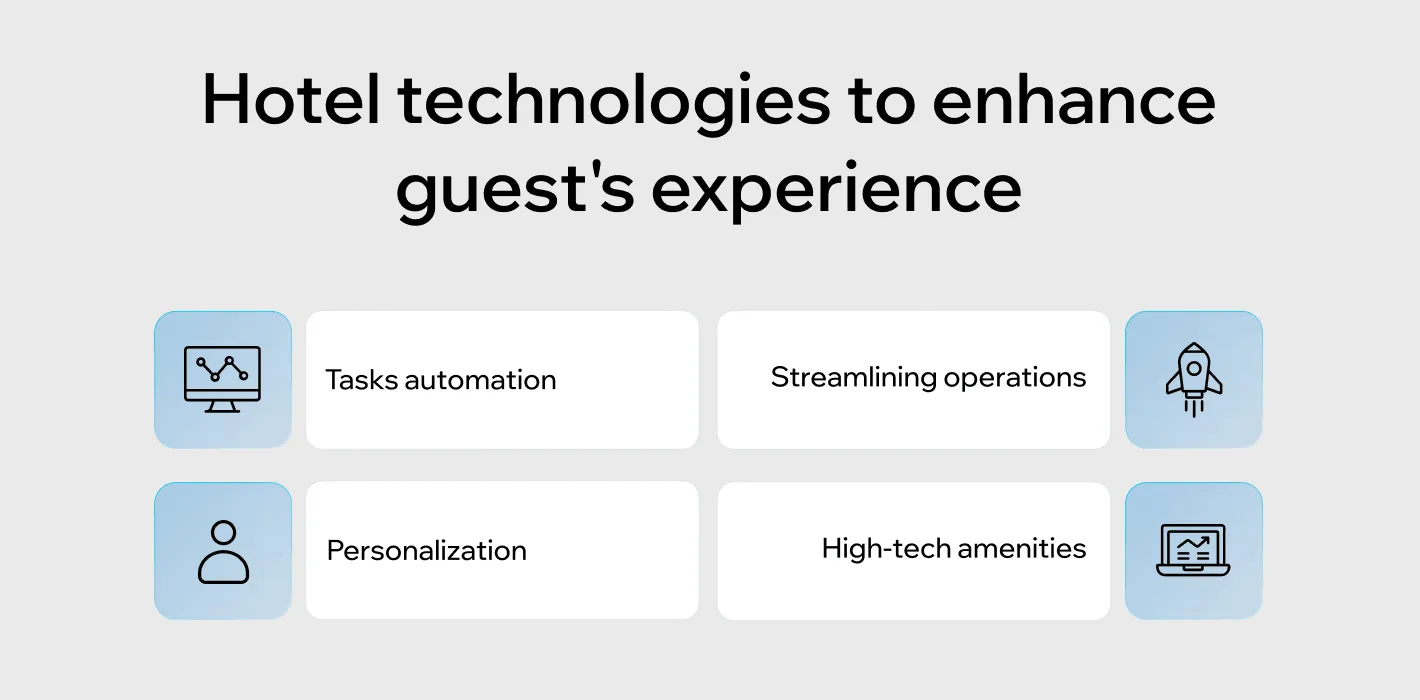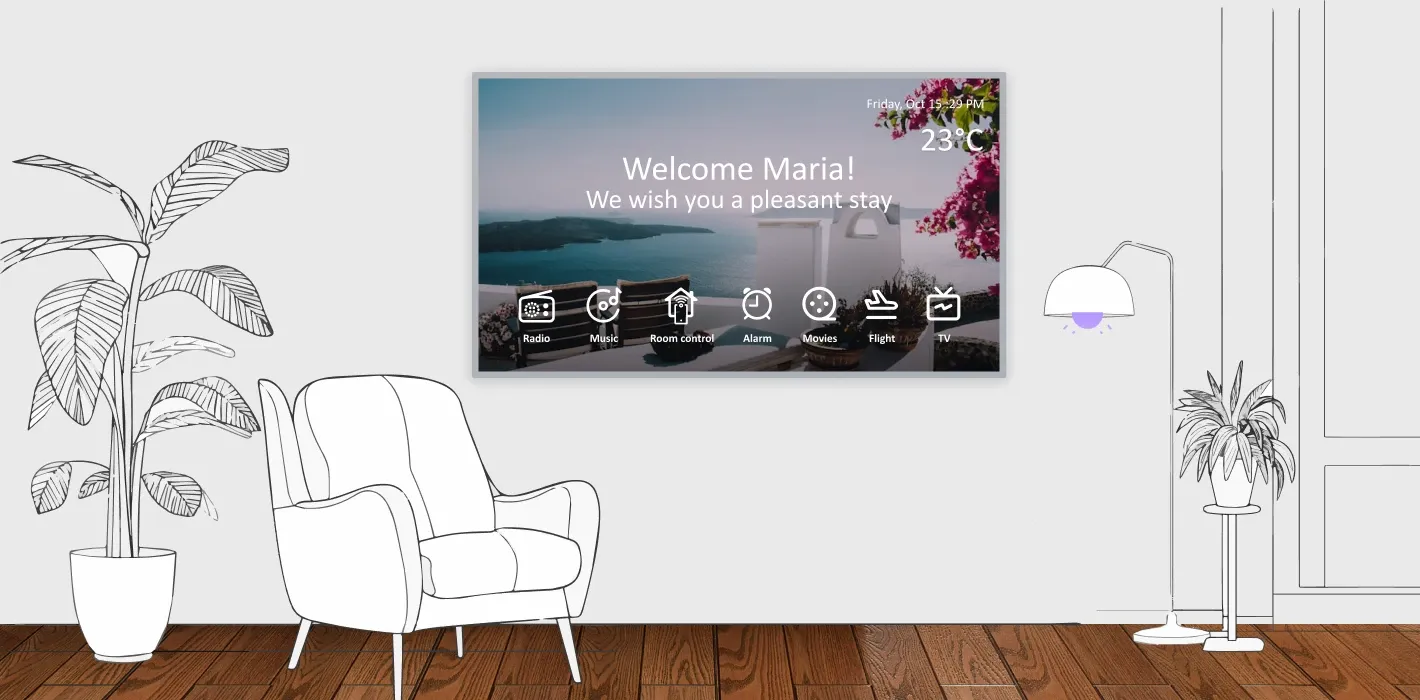

Modern travelers looking for the best hotel experience know how to leverage technology. While they often have substantial spending power, they’re also savvy about finding the best deals.
As a hotel owner, your goal should be to provide an exceptional guest experience that sets you apart from the competition and encourages repeat business.
The success of any company hinges on keeping customers satisfied. Even minor missteps, like a shift in tone or ignoring a guest's concerns, can lead to dissatisfaction. That’s why prioritizing customer happiness is crucial to any effective hotel marketing strategy.
Fortunately, enhancing the hotel guest experience is now easier than ever with the help of smart technology.
Ready to discover how you can transform the guest experience with it? Let’s dive in.

Creating an exceptional guest experience involves ensuring hotel guests feel genuinely appreciated, joyful, and confident that their stay was worth every penny.
Hotels worldwide are influencing their guests' perceptions by investing significantly in digital transformation, automating additional tasks, and enabling customers to utilize self-service equipment.
Your staff’s communication capacity is the primary factor in guaranteeing visitors a pleasant hotel guest experience.
Modern technology lets hotel staff quickly access exhaustive guest records, giving each guest a more personalized experience.
Creating an excellent hotel guest experience is about making visitors feel valued, joyful, and confident that their stay is worth every penny. A lasting impression relies on providing each guest with a memorable and unique experience that stands out.
The guest service experience begins long before a visitor arrives at your hotel. It includes every touchpoint, from researching and booking to their stay and departure. Ensuring each step of this journey is seamless and enjoyable directly impacts your hotel’s reputation, customer loyalty, and revenue.
The key to a thriving hotel business is ensuring guests enjoy their stay from start to finish. This approach generates positive reviews and word-of-mouth referrals, significantly increasing the likelihood of repeat business.
After all, a satisfied guest is more likely to return and recommend your hotel to others, creating a steady revenue stream.
To stand out in a competitive market, your hotel should strive to offer a remarkable experience that transcends mere expectations. Most travelers rely heavily on online reviews and a hotel’s reputation when choosing where to stay. That’s why maintaining high levels of guest satisfaction is crucial to attracting new customers and retaining existing ones.
Emphasizing the guest experience and understanding its value is the only way to thrive in the hospitality industry. This focus can attract new guests, encourage repeat visits, and ultimately help manage costs through customer retention.
The rapid advancement of technology is continuously reshaping the hotel industry, influencing how guests perceive their stay and what they expect from their accommodations.
Today’s tech-savvy guests expect convenience, speed, and simplicity in every interaction. In fact, 63% of consumers are happy to share their data for a service, product, or guest experience they truly value.
 Hotels can meet these expectations through the effective use of smart technology.
Hotels can meet these expectations through the effective use of smart technology.
Digital transformation allows hotels to automate various tasks and offer self-service options, significantly enhancing the guest experience and operational efficiency.
Automation streamlines communication with guests, making interactions more convenient and efficient. For example, automating check-in, check-out, and booking processes allows hotel staff to focus on delivering high-quality service rather than getting bogged down with repetitive tasks.
A study by Oracle found that 73% of travelers prefer hotels that offer self-service options—a clear indicator of the growing demand for automated solutions.
Technology also enables hotels to simplify complex tasks like revenue management—allowing staff to focus on building strong customer relationships and providing personalized service.
This shift improves efficiency and enhances the overall guest experience. It minimizes manual errors, speeds up service delivery, and allows hotels to manage more guests without compromising service quality. In fact, according to Oracle's study, 39% of guests prefer a contactless experience for core hotel transactions.
Personalization is becoming increasingly important in meeting guest expectations. Thanks to technology, hotels can offer tailored services and personalized recommendations for local activities and attractions.
This level of customization encourages guests to return, as they are more likely to remember a positive and personalized experience. PwC’s research shows that 42% of consumers are willing to pay more for a friendly and welcoming experience, while 43% would do the same for a more convenient guest experience. Overall, 65% of US consumers say that a positive experience has more influence than good marketing.
By prioritizing personalization, hotels can foster deeper connections with their guests, creating memorable stays that guests will want to relive. Personalization goes beyond just a friendly greeting or room upgrade; it involves anticipating guests' needs and preferences before they even ask.
An integral component of what the guest experience does for hospitality is high-tech gadgets. For instance, smart room technology, like lighting and climate control systems, can significantly enhance the comfort of a guest's stay. These systems allow guests to adjust their room environment—whether they’re working, lounging around, or getting ready for a night out.
For 45% of guests, the number one must-have is an on-demand in-room entertainment setup that connects to their personal streaming or gaming accounts.
Many modern hotel rooms feature smart TVs, improving the guest experience with the entertainment value. These devices provide access to social media, gaming, streaming services, and other apps, allowing guests to enjoy their favorite movies and shows just as they would at home.
Some smart TVs offer personalized content recommendations based on guests' viewing history and preferences. They can seamlessly connect with other in-room technologies, enabling guests to adjust lighting and temperature or order room service with a simple click.
One of the best things smart TV solutions offer is tailored entertainment recommendations. These systems closely examine watching habits and preferences using cutting-edge artificial intelligence and machine learning technologies. Customers can easily find relevant content, making their stay more enjoyable.
Smart TVs also allow guests to connect their personal devices, such as tablets, laptops, and smartphones, to the TV.
This technology ensures convenience for both staff and guests, simplifying tasks such as personalized welcome messages, service recommendations, and room service requests.
With customizable hotel middleware from HotelSmarters, you can turn your hotel room TVs into intelligent assistants to streamline management. This robust platform enables customized welcome greetings, service recommendations, ordering, and requests for further serviceability.
HotelSmarters enhances the guest experience and hotel operations by providing a smart, user-friendly interface. Contact us to learn more.
 How do you improve the guest experience in a hotel? It comes down to ensuring your business satisfies all customer needs without neglecting them. Below are our top five tips for ensuring their satisfaction.
How do you improve the guest experience in a hotel? It comes down to ensuring your business satisfies all customer needs without neglecting them. Below are our top five tips for ensuring their satisfaction.
Great guest experiences start with warm, friendly communication. A simple message like “We’re excited to welcome you!” makes guests feel valued before they even arrive.
Connecting early sets the stage for a memorable stay. Highlight unique amenities, offer exclusive deals, and personalized recommendations based on their interests. Sharing local tips adds a thoughtful touch, turning a good stay into a great one.
When guests feel appreciated and get great value, they’re more likely to return, creating a win-win situation for both them and your business.
Keep the booking process quick and hassle-free to give your guests a great start to their experience. Did you know that 30–40% of online travel bookings are made on mobile devices?
That’s why it's so important to ensure your website is mobile-friendly. A smooth, easy-to-use mobile site can boost bookings and leave a positive first impression.
Social media is another excellent way to connect with potential guests. Sharing eye-catching photos and updates on platforms like Facebook and Instagram can draw people in. Plus, using tools to manage and track these interactions can help you stay on top of potential bookings and engage more effectively.
Linking your booking engine to your website and social media accounts makes the check-in and check-out process a breeze. These features improve the digital guest experience in the hospitality industry. They make life easier for your guests and help your hotel run more smoothly—giving you an edge in today’s competitive hospitality market.
A great guest experience often depends on how well your staff communicates. If you browse the review section of any online travel agency or hotel, you'll likely find comments from unhappy guests who felt their stay was ruined by poor communication.
Those one- or two-star reviews often point to missed opportunities to connect with guests or misunderstandings that could have been easily avoided.
That’s why it’s so important to ensure communication flows smoothly and naturally. Regular training for your staff can help them sharpen their communication skills so they can always engage with guests in a friendly and professional manner.
This is what the guest experience is all about, especially in a world where 59% of consumers feel companies have lost the human element of customer experience.
When your team communicates well, guests feel heard and appreciated, leading to a more enjoyable stay. This boosts guest satisfaction, encourages loyalty, and inspires positive reviews, making your hotel a top choice for future travelers.
Your guests seek top-notch service and a personal touch that shows you care about their unique needs. Modern technology allows your hotel staff to quickly access detailed guest records, allowing you to create a more personalized experience for each visitor.
Imagine a couple celebrating their anniversary—why not surprise them with a chilled bottle of champagne and some chocolate-covered strawberries waiting in their room? Small gestures like this can make a big impact and leave a lasting impression on the hotel guest experience.
Personalization can be as simple as remembering a guest’s favorite room type or recommending a nearby restaurant that fits their dietary needs.
When guests feel genuinely understood and looked after, they’re not just more likely to come back—they’re also more likely to become loyal fans of your hotel, sharing their positive experiences with friends, family, and even on social media.
Word-of-mouth marketing and guest loyalty are priceless, helping to ensure your hotel’s long-term success and profitability.
One tip for increasing guest satisfaction in hotels is asking about their experience. Reputation management tools make it easy to survey guests both before and after their stay.
The feedback you collect will highlight what you’re doing well and where there’s room for improvement. Acting quickly on this feedback allows you to fix issues before they turn into bigger problems, helping you avoid negative reviews. Plus, positive comments can be turned into glowing ratings and five-star reviews that attract even more guests.
Asking for feedback shows your guests that you care about their experience, which can go a long way in building trust and loyalty.
 The hospitality industry is gradually adapting as technology becomes more ingrained in daily life. While traditionally hesitant, hotels are now embracing innovation to enhance guest experiences, with more advancements on the horizon.
The hospitality industry is gradually adapting as technology becomes more ingrained in daily life. While traditionally hesitant, hotels are now embracing innovation to enhance guest experiences, with more advancements on the horizon.
New technologies help businesses streamline workloads, boost efficiency, and improve inventory tracking. They also enhance customer interactions across multiple platforms, creating smoother and more connected experiences.
Hotels increasingly use artificial intelligence (AI) for customer service, assistance, and decision-making, optimizing guest management. Meanwhile, augmented and virtual reality (AR/VR) offer more immersive experiences, capturing guests’ interest before they even arrive.
Modern hotels integrate voice-activated assistants for personalized guest interactions, making stays more convenient. Contactless check-in and automated front desks are also becoming the norm, simplifying arrivals and reducing wait times.
Guests now expect smart room features like mobile-controlled lighting, temperature adjustments, and keyless access. These innovations not only enhance comfort but also leave a lasting impression—ensuring guests are eager to return.
The guest experience in hospitality refers to a guest’s overall satisfaction during their stay. Influential factors include service quality, comfort, personalization, and convenience.
Hotels can improve guest satisfaction by leveraging technology to offer personalized services. This approach ensures a comfortable environment and encourages real-time feedback.
Hotel guest experience examples include seamless mobile app check-in and personalized room settings using IoT devices. They also offer the ability to request services through an interactive smart TV platform.
Smart technology empowers hotels to provide customized services by knowing what their visitors prefer, enhancing the hotel guest experience.
Smart technology simplifies hotel stays for visitors by making certain actions easier. They use their phones or voice commands, mobile check-ins, digital room keys, and voice-activated room controls to manage their stay.
Smart technology helps hotels run more smoothly by streamlining tasks, using less energy, and making visitors happier. Automated system tracking and modifying energy use depending on occupancy lowers running expenses.
The importance of guest experience is crucial because it directly impacts a hotel’s reputation, customer loyalty, and revenue. Focusing on this vital aspect ensures guests are happy, encourages repeat visits, and generates positive reviews.
Founder / CEO
Andranik is the CEO and Co-Founder of inoRain OTT and the Co-Founder of HotelSmarters, specializing in next-generation streaming technologies and digital transformation for the hospitality sector. He focuses on building innovative, scalable solutions for video delivery, OTT monetization, and data-driven hospitality management. His work bridges technical sophistication with practical business impact, helping organizations modernize their digital ecosystems and improve operational efficiency.